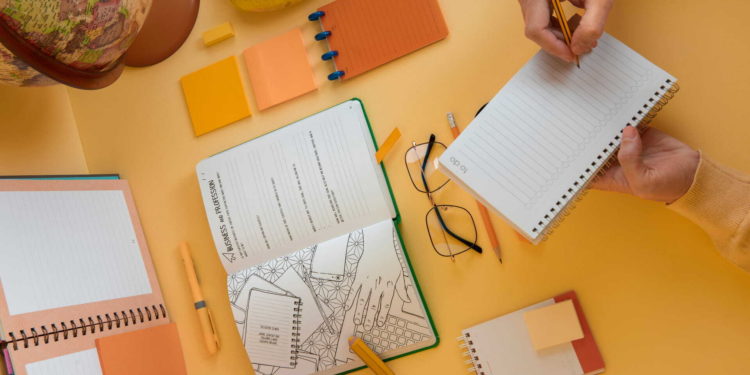Mindfulness journaling is an incredible practice that combines the benefits of journaling and mindfulness in a powerful way that enhances mental health and well-being. Several factors relax a person and have a great impact on mental health. Journaling is one of them with amazing advantages. It is like you pour your heavy heart out and pen down your feelings. Journaling for self-improvement, reducing tension, worry, and negative thoughts or anything that needs to be articulated is possible with mindfulness, which is the practice of being totally present and involved in the moment.
One of the most amazing parts of journaling is that it offers a secure space for people to openly express their thoughts and feelings, promoting contemplation and personal development. Combining these two approaches of Mindfulness journaling can have revolutionary effects.
In Journaling for Mental Health, Setting out a little period every day to sit still, take deep breaths, and pay attention to your thoughts and emotions is the best gift you can give yourself. After that, you write down the observations while allowing your ideas to come to you organically. Writing thoughtfully can help you become more conscious of your inner experiences, which can help you gain emotional clarity and a better awareness of yourself.
Suppressing your feelings is not a good thing and nor it is to always ignore your thoughts. Let them flow into paper.
You can have a diary or notebook or anything to have your ideas written. Or else you can habit Digital Journaling which is the same concept as writing but using digital mediums like apps or digital devices where journaling can be done. This way you can learn to meditate, take the routine of your day, and deal with your feelings positively and healthfully.
Furthermore, with several journaling examples, you can explore more of this habit.
Nevertheless, accessibility is one of the best things about Mindfulness journaling. All you need is a notebook, a pen, and a few minutes of your time; no special skills or tools are required. Writing in a diary with mindfulness can be helpful if you are trying to manage stress, get clarity, or just be more connected to your being. Your mental and emotional health will probably improve as you establish Mindfulness journaling as a regular habit.
Being mindful allows getting to know ourselves and our experiences. It is like a journey to the interior where one can whisper and listen to the inner world at the same time.
Keeping Mindfulness journaling can also help you stay reminded of your objectives and life lessons. It provides a space for you to have a purposeful, thoughtful talk with yourself.
Understanding the Idea of Mindfulness

The practice of mindfulness through Digital Journaling or any other means involves purposefully concentrating your attention on the here and now while maintaining an accepting and nonjudgmental mindset.
It involves being completely conscious of all of your ideas, emotions, physical sensations, and external circumstances without becoming sucked into or responding to them. Practicing mindfulness teaches you to live in the present moment and stop thinking about the past or the future.
It all comes down to paying attention to the present moment in mindfulness. It is like being conscious of your present thoughts, feelings, and bodily experiences along with your immediate surroundings. You can lessen your inclination to worry about the past or the future by keeping your attention on the here and now. This can happen through Mindfulness journaling too or Journaling for mental health.
It’s wise to examine your thoughts and feelings without assigning them a positive or negative label when engaging in mindfulness practices. You can accept your experiences for what they are, free from layers of negative judgment or self-criticism when you adopt this nonjudgmental attitude. Afterward, you can contemplate what is good and bad for you.
Furthermore, Being mindful promotes having compassion for both other people and yourself. You can develop more understanding and compassion for other people by treating your own experiences with kindness and understanding.
Exploring the Advantages of Mindfulness Journaling

The habit of Mindfulness journaling has numerous benefits and you can clearly see and feel this once you add this to your routine.
Lowers Stress:
This is one of the noticeable changes you will see after having the habit of Journaling for mental health. Composing your ideas and emotions down on paper can reduce stress and promote mental clarity. It gives tension and anxiety a constructive passage to out, improving your ability to analyze and control your feelings.
Improves Self-Awareness:
Mindfulness journaling helps you become more conscious of your feelings and thoughts. You can identify trends, gain a deeper understanding of who you are, and make wiser decisions as a result of this improved knowledge.
Enhances Emotional Regulation:
Consistent journaling helps in the recognition and control of your feelings. You can better regulate your emotional reactions by being aware of and vocal about your feelings.
Increases Creativity:
Mindfulness journaling or Digital Journaling opens up new avenues for creative thought. It lets you investigate various sides of your life and experiences by opening your mind to fresh viewpoints and concepts. Organizing your thoughts and keeping a journal can help you perceive circumstances more clearly, which can improve your problem-solving skills. Better decision-making and problem-solving skills can result from this.
Encourages Healing:
Writing is a therapeutic way to process painful or challenging events. It nurtures emotional healing and resilience by enabling you to process and let go of negative feelings.
Strengthens Mindfulness:
Journaling consciously contributes to the strengthening of mindfulness as a practice. It teaches you how to be alert, involved, and in the moment.
How to Develop a Habit of Mindfulness Journaling

Building any habit might sound easier, but it requires commitment and consistency too. Let us understand how to build a Mindfulness journaling habit
- Start Little: Allocate a few minutes each day to start. As you get more accustomed to the practice, gradually extend the duration. Don’t make a very high jump from the beginning.
- Establish a Routine: Pick a time of day to write in your journal, such as right before bed or in the morning. Maintaining the habit helps it become stronger.
- Establish a Comfortable Space: Look for a peaceful, comfortable area where you can do Mindfulness journaling without interruptions. Make this area welcoming and comfortable for resting.
- Be Non-Judgmental: Have an open mind when starting Journaling for self-improvement. Put more effort into freely and honestly expressing oneself than worrying about grammar or spelling.
- Reflect Often: Go back to your earlier writings. Taking a routine of your writing allows you to see your progress and obtain fresh perspectives.
- Have patience: It takes time to form new habits. Even if you skip a day or two of practice, be kind to yourself and determined in your commitment to it.
The Connection between Mental Health and Mindfulness Journaling

Journaling for mental health is an unbelievable way of soothing you and feeling good. Emotional and psychological well-being can be significantly improved for individuals by combining mindfulness with the reflective practice of journaling. By being mindful, people are less likely to worry about the past or the future or to dwell on the past. Stress, anxiety, and depressive symptoms can be lessened by journaling since it gives a person a way to process events and express feelings.
Furthermore, Writing with awareness and compassion for oneself is a beneficial practice. It supports people in adopting a more accepting and gentler mindset toward oneself, which is essential for mental wellness. Mindfulness journaling can improve emotional resilience, which makes overcoming obstacles and failures simpler. People who often reflect on their thoughts and feelings can better understand their mental states, recognize triggers, and create more effective coping mechanisms.
Mindfulness journaling is a simple, yet very powerful, technique that can improve mental health and overall well-being. Those who combine therapeutic writing with mindfulness techniques can see significant changes in their psychological and emotional well-being. Although it takes time and commitment to establish the practice of mindfulness journaling, the rewards are well worth the effort.
Furthermore, you might experience an increase in emotional stability, self-awareness, and understanding as you incorporate this exercise into your everyday routine. Whether your goals are stress reduction, clarity, or developing a closer relationship with yourself, mindfulness journaling is an effective tool to support your mental health journey.













